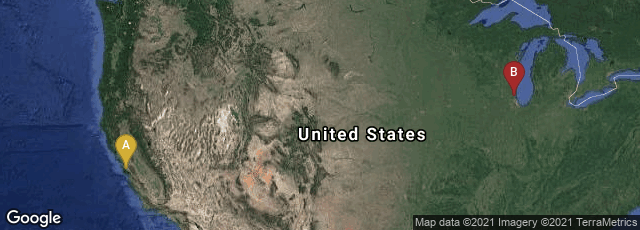
A: Mountain View, California, United States, B: Libertyville, Illinois, United States
On August 15, 2011 Google announced that it agreed to acquire the smart-phone manufacturer Motorola Mobility, headquarted in Libertyville, Illinois, for $12,5 billion. This was Google's largest acquisition to date.
"In a statement, Google said the deal was largely driven by the need to acquire Motorola's patent portfolio, which it said would help it defend Android against legal threats from competitors armed with their own patents. This issue has come to the fore since a consortium of technology companies led by Apple and Microsoft purchased more than 6,000 mobile-device-related patents from Nortel Networks for about $4.5 billion, in early July. Battle lines are being drawn around patents, as companies seek to protect their interests in the competitive mobile industry through litigation as well as innovation.
"However, as people increasingly access the Web via mobile devices, the acquisition could also help Google remain central to their Web experience in the years to come. As Apple has demonstrated with its wildly popular iPhone, this is far easier to achieve if a company can control the hardware, as well as the software, people carry in their pockets. Comments made by Google executives hint that Motorola could also play a role in shaping the future of the Web in other areas—for instance, in set-top boxes. Motorola is by far Google's largest acquisition, and it takes the company into uncertain new territory. The deal is also likely to draw antitrust scrutiny because of the reach Google already has with Android, which runs on around half of all smart phones in the United States.
"Motorola, which makes the Droid smart phone, went all-in with Google's Android platform in 2008, declaring that all of its devices would use the open-source mobile operating system.
"Before his departure as Google CEO, Eric Schmidt had begun pressing Google employees to shift their attention to mobile. Cofounder and new CEO Larry Page seems determined to maintain this change of focus. In a conference call this morning, he told investors, 'It's no secret that Web usage is increasingly shifting to mobile devices, a trend I expect to continue. With mobility continuing to take center stage in the computing revolution, the combination with Motorola is an extremely important event in Google's continuing evolution that will drive a lot of improvements in our ability to deliver great user experiences.' " (http://www.technologyreview.com/web/38320/?nlid=nldly&nld=2011-08-16, accessed 08-17-2011).
On January 29, 2014 Larry Page, CEO of Google published in the Google Official Blog that they were selling Motorola's handset division for a multi-billion dollar loss:
"We’ve just signed an agreement to sell Motorola to Lenovo for $2.91 billion. As this is an important move for Android users everywhere, I wanted to explain why in detail.
"We acquired Motorola in 2012 to help supercharge the Android ecosystem by creating a stronger patent portfolio for Google and great smartphones for users. Over the past 19 months, Dennis Woodside and the Motorola team have done a tremendous job reinventing the company. They’ve focused on building a smaller number of great (and great value) smartphones that consumers love. Both the Moto G and the Moto X are doing really well, and I’m very excited about the smartphone lineup for 2014. And on the intellectual property side, Motorola’s patents have helped create a level playing field, which is good news for all Android’s users and partners.
"But the smartphone market is super competitive, and to thrive it helps to be all-in when it comes to making mobile devices. It’s why we believe that Motorola will be better served by Lenovo—which has a rapidly growing smartphone business and is the largest (and fastest-growing) PC manufacturer in the world. This move will enable Google to devote our energy to driving innovation across the Android ecosystem, for the benefit of smartphone users everywhere. As a side note, this does not signal a larger shift for our other hardware efforts. The dynamics and maturity of the wearable and home markets, for example, are very different from that of the mobile industry. We’re excited by the opportunities to build amazing new products for users within these emerging ecosystems.
"Lenovo has the expertise and track record to scale Motorola into a major player within the Android ecosystem. They have a lot of experience in hardware, and they have global reach. In addition, Lenovo intends to keep Motorola’s distinct brand identity—just as they did when they acquired ThinkPad from IBM in 2005. Google will retain the vast majority of Motorola’s patents, which we will continue to use to defend the entire Android ecosystem."